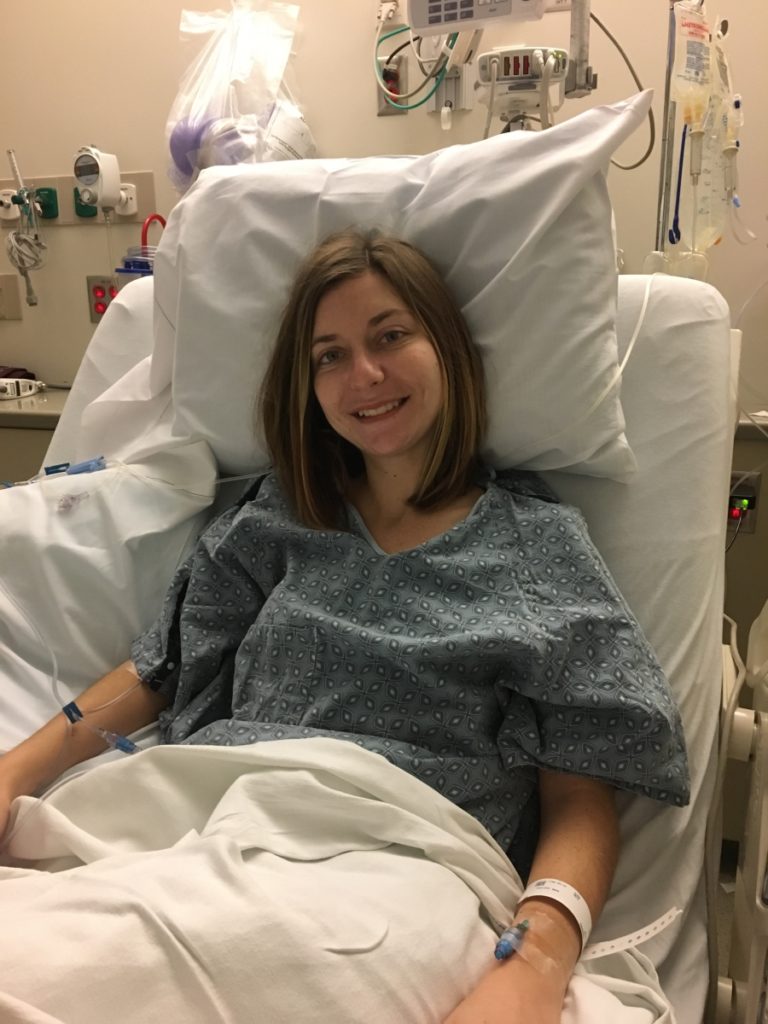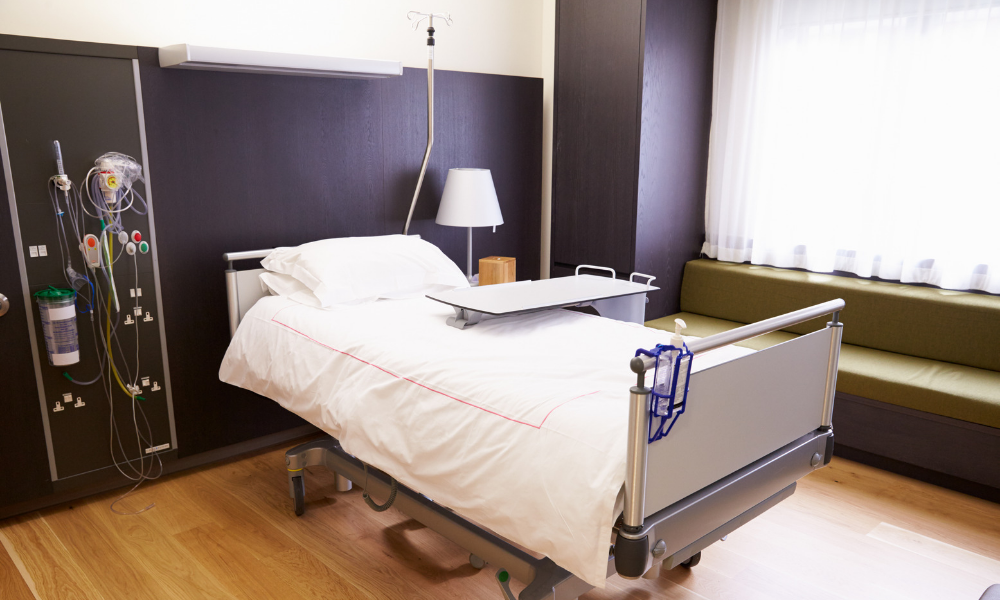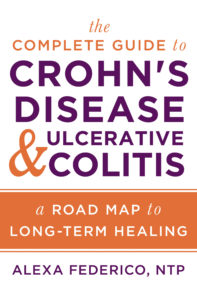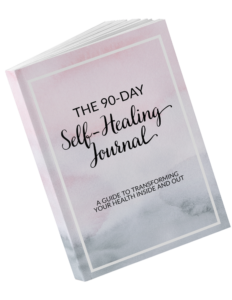This post contains affiliate links, in which I earn a commission of sales I refer without any extra cost to you.
It’s January 2019, and I recently reached a milestone of having a diagnosis of Crohn’s disease for 13 years. I am eager for a fresh start because most of 2018 I was dealing with complications from Crohn’s disease, namely three fistulas and an abscess.
Abscesses are hard to treat, but they are a complication that people who have Crohn’s disease or ulcerative colitis are susceptible to. Abscesses are infections that form their own pocket with strong walls. This is to protect the rest of the body from becoming septic. Thank goodness for that.
However, this makes abscesses difficult to treat. I did six weeks of antibiotics (two of those were IV) and I had a drain in for three weeks. After, I was told to expect some leftover draining for a few days. Then I assumed a few weeks. Soon, it was hard to have any hope at all that my problems were going away.
I continued to eat well and supplement. I drank bone broth. I took colloidal silver and oregano oil capsules. I drank teas and consumed honey; known for combatting bacteria. Alas, it came time to get my life back after months of this nonsense. Surgery it was! And I scheduled it sometime before Thanksgiving, to be done on January 7, 2019.
Making the Decision
This is obviously the first step, and not one I can advise you on too much. Getting surgery, or any procedure or starting any medication (or any decision involving your body) has to be 100% up to you. You cannot have fear surrounding a decision like this. You absolutely need to be comfortable with it.
I didn’t really have a decision if I wanted to get rid of this once and for all. Once I accepted it, I felt ready to get it over with.
What to Ask Your Surgeon
These are questions I asked initially but also things people recommended I ask or ones I thought of later.
- What exactly will be removed?
- How much do you expect to take out?
- How long is the procedure?
- Can it be performed laparoscopically or only traditionally?
- How long will I be in the hospital?
- How long is the recovery process and what does it look like?
- Will you (your surgeon) be performing the majority of the surgery?
- What are the risks of the surgery vs. risks of not doing it?
- What is involved to prep for the surgery?
- If I have any wounds, do they need to be packed after surgery?
- Will you be utilizing tap blocks for pain before I’m awake?
- What is offered for pain management?
- Will I need a temporary ileostomy or colostomy? (Requires a reversal surgery)
Surgery Prep
For my prep, I could have breakfast the morning before, but after that I could only consume clear liquids. Stock up on broths, jello/gelatin treats, teas, and if allowed, clear hard candies. I was provided a surgery kit with information as well as two Ensure drinks, antibiotics, and a special soap.
Later in the day I had to start drinking the prep drink. Nasty stuff, of course. I didn’t get more than half down. Not saying that’s what you should do, I just struggled getting it down and it made me feel gross. I replaced the Ensure drinks with this brand, thanks to Jamie for finding them for me!
I would take a walk, especially outside if you can. But also relax, do some activities you enjoy, and try to get yourself calm and ready.
The Surgery
I was so grateful to have had the first time slot on a Monday morning, so I got there as the sun was rising and was out of surgery by 10:30am.
Ask the staff any questions you may have to stifle lingering anxieties. Breathe deeply, relax, and trust your team.
Recovery
You will probably feel drowsy and maybe groggy after waking up. A nurse will be with you. If someone is waiting for you at the hospital ( I highly recommend that someone is), then ask if they can be with you.
Time went by fast while I was still half out-of-it in the recovery room. After a few hours when I felt awake, I had some clear liquids. The key is to go slooooooowly. Your bowels have basically been asleep, so don’t shock them!
My surgery went perfectly and I had no active disease afterwards. This was great news. I went home on my second day post-op. Here is how recovering went.

Days 1-3
Diet
I had clear liquids again for breakfast and then solid food from then on out. I ordered chicken, rice, and a vegetable, because I wanted something I knew I could digest well. Food and water settled fine with me, but always go slowly. My appetite was not much and I did not care for any of the “real” food I eat normally. I wanted bland, carbohydrate-heavy snacks and junk food.
Pain
I needed pain medications around the clock, and missing any left me struggling to catch up and get comfortable. For short term usage and in times of acute pain, I fully embrace the inventions that modern medicine have graced us with. I used a combination of prescription pain medications and Tylenol. As long as I stayed on schedule I did not have much pain.
However, I experienced a lot of trapped gas pain. This is normal after anesthesia and surgery, but man it is no joke! At times it was very painful. To alleviate, walk and stand up as much as you can without causing more pain, lay on your left side, and take a lot of deep breaths.
Feeling
I had some nausea and queasiness, mostly in the mornings. I felt tired and weak, and walking around caused shortness of breath. It scared me; I wasn’t prepared. Sometimes getting nervous about shortness of breath caused me to get nervous and have an even harder time breathing. But you can prevent this now!
I had moments of frustration. Like when I wanted to get off the couch but could not use my abdominal muscles to get up or when I could not get comfortable laying down. Those will be fleeting.
Days 4-6
Diet
On day 4 my appetite increased and it grew a little every day after that. I found myself craving food without any queasiness. I felt ready to eat more protein and fat.
Pain
My pain got steadily better on days 3-4 and continued to improve. I needed much less pain medication.
The trapped gas pain was still there and causing me a good deal of pain and I upped my walking game to try to help it pass.
Feeling
I had less feelings of frustration as I started to move easier. I had less shortness of breath, which was a relief.
Days 7-10
Diet
Finally, my aversion to protein was gone! I was still hungry after eating the smaller portions I had gotten used to. I had steak for the first time in a while and gobbled it up.
Pain
I needed even less pain medication, generally taking pain medicine prescription or OTC 1-2 times a day. Trapped gas was gone. Breathing felt pretty normal.
Feeling
I could now bend and move much more fluidly. I felt almost normal. I did not start walking fully straight yet; whether it would hurt or is just my own fear, I still walked a little hunched because I was worried of stretching the incision area.
I was actually in the mood to be on my laptop and do work for a few hours a day, so I did that and took breaks to relax.
Days 11-14
Diet
My appetite is fully back to normal. I am excited to start making real meals again.
Pain
On the evening of day 11 I realized I had not thought about pain at all, because I didn’t have any! That was the first day I had no discomfort at all and my first day totally pain-med free.
Feeling
I started feeling 100% me again. I started walking straight, bending, and moving however I felt like and did not notice anything different.
Best Practices
- Walk as much as you can comfortably. This will move the gas and your bowels along as well as build your strength.
- Take deep belly breaths. Ideally, a few every hour.
- Bring activities to keep you busy in the hospital and at home such as: books (may I suggest my own?), podcasts and music on your phone, dvds/Netflix, coloring books, crossword puzzles, word searches
- Drink and eat slowly. Stay hydrated and include protein, most importantly. If you have a poor appetite, include collagen peptide protein in tea, soup, a smoothie, pudding, etc. Use the discount code “girlinhealing” on the Further Food website!
- Have a heating pad to use for trapped gas.
- I decided to sleep on my couch, but you may benefit from a bed wedge so that you can control the incline you are sitting at (which you will want to do!)
- If you have wounds that need to be packed, it may be uncomfortable or painful. This was improved for me by taking pain medication a half hour it was done and having the nurse use prescription Lidocaine cream.
- Go food shopping before the surgery and even meal prep if you can. You will need someone at home to support you so they can help prepare you food for the first few days at least.
- Make sure you have help at home for the first week. I was able to get by on my own (but did not attempt driving or leaving the house) at week one, but I appreciated the assistance into week two. I would take off work for two weeks just to be safe.

My hope is that these tips help you through your surgery. Let me know if I achieved that!






